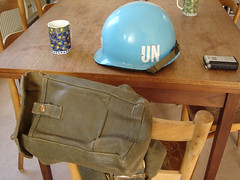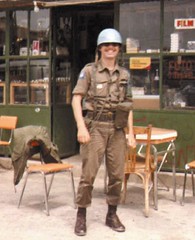Tomorrow is an insanely big day for interviews on the podcast. I’ve got three lined up. Two I’ll leave as a surprise, though I’ve mentioned them before. The other is the interview with a very interesting Afghani doctor who works with the US military in Afghanistan. Which means I need to get to sleep to be fresh and alert when I make that call first thing in the morning.
But before I go off to bed. Today I was catching up on Ha’Aretz articles from the past few days. I really appreciate the reporting in that paper, though Im sure some would scoff at its plethora of opinions and open criticism of the *gasp* Israeli government, which apparently not far from calapse, oddly enough.
 In particular today, there is one article that embodies the rediculousness and the iron fisted destructiveness of the Israeli military actions in Gaza, which in theory they pulled out of a while back. This story was about the most modern power station in the middle east, which had been built by a cooperation involving Enron (haha). Back in June the Israeli military bombed the power station, effectively cutting off 60% of Gaza’s energy. The bombing was said to be in response to Hamas militants kidnapping the Israeli soldier. Either that or it was punishment for the citizens having elected Hamas. Even more bizarre, the remaining 40% of electricity for the terroritory is purchased from Israel!
In particular today, there is one article that embodies the rediculousness and the iron fisted destructiveness of the Israeli military actions in Gaza, which in theory they pulled out of a while back. This story was about the most modern power station in the middle east, which had been built by a cooperation involving Enron (haha). Back in June the Israeli military bombed the power station, effectively cutting off 60% of Gaza’s energy. The bombing was said to be in response to Hamas militants kidnapping the Israeli soldier. Either that or it was punishment for the citizens having elected Hamas. Even more bizarre, the remaining 40% of electricity for the terroritory is purchased from Israel!
Imagine. Your country/land is crippled by the very government you have to then turn to and pay for electricity which they in effect deprived you of to begin with. Must be a strange purchase to make, maybe no one looks anyone in the eye and they try to forget the exchange after its over.
Also according to the article, Israel could have paralyzed the station simply by withholding fuel; yet for some reason they chose to destroy it. And then we hear about governments blaming the Palestinian Authority for not having control over what people and militants do in their terroritory. They call them ineffective and use violence to inflict collective punishment. Then to add further insult, you had the western nations declaring sanctions against the Palestinian government, which then means they can’t pay the salaries of their employees and YES military. Who then get angry and desperate, and eventually resort to violence.
People always take the cop out and call it a big mess. Everyones fault, they’ll say. Makes it easier to talk about Israel and Palestine that way, you blame everyone and ignore it, that way no one can accuse you of taking sides and there’s no need to pay attention to facts.
Once again that quote I mentioned last week, comes to mind, “It is as if you cut off my arms, chop off my legs, throw me in the ocean, and then ask – why can’t you swim?”



 In particular today, there is one article that embodies the rediculousness and the iron fisted destructiveness of the Israeli military actions in Gaza, which in theory they pulled out of a while back. This
In particular today, there is one article that embodies the rediculousness and the iron fisted destructiveness of the Israeli military actions in Gaza, which in theory they pulled out of a while back. This